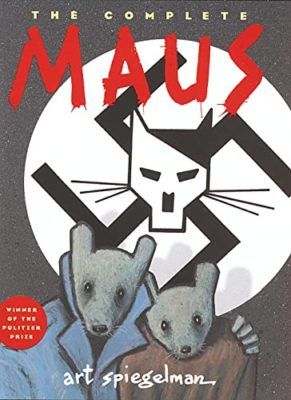This week’s resource highlight is all about books.
Each year books are added and removed from curriculums for a variety of reasons. Last month, the McMinn County Board of Education in Tennessee voted to remove the book Maus by Art Spiegelman from their eighth grade ELA curriculum. I’m not going to discuss in depth the Board’s arguments in this email (you can read the meeting minutes here). Rather, I’d like to highlight two concerning aspects of their rationale for removal, the impact it has on how we teach history, and the support OJMCHE offers when teaching difficult and traumatic histories such as the Holocaust in our current social and political climate.
Teaching honest history means including a spectrum of experiences and voices. (It should go without saying that I am not endorsing including perspectives that distort or deny the reality of the history.) While one book may anchor the unit, other resources should be brought in to provide a fuller understanding of the history. Removing Maus because of “objectionable language” and graphics sanitizes, and arguably distorts, the reality of the Holocaust. Learning about the Holocaust through Jewish experiences should make us uncomfortable. It forces us to confront our role and responsibility in disrupting and preventing antisemitism, racism, and other identity based violence.
Maus is the story of Art Spiegelman’s father’s Holocaust experiences as told by him. As such, the book illustrates, literally, the intergenerational legacy and trauma of the Holocaust. One Board member’s comments reveal his inability to recognize how history is inherited, impacting our present and future. The section of the book that includes the “objectionable language” is an honest account of how traumatic histories affect our relationships with others. It provides us an opportunity to examine how we process trauma and practice care and compassion for those who are struggling.
So, now what?
As more and more books are being challenged, I have no doubt that many of you are nervous to cover difficult histories. Below are three ways OJMCHE can help.
Pop-Up Professional Development
Wednesday, February 16 from 4 – 5pm PST | 1 PDU Available
Come join Amanda Coven from OJMCHE and Amit Kobrowski and Tina Roberts from ODE to discuss teaching difficult topics in our current climate and guidance on how to respond if you are challenged.
Booklists
OJMCHE has partnered with Dr. Sarah Minslow and the Multnomah County Library to curate a list of age-appropriate recommended books that align with Oregon’s Holocaust and Genocide education mandate. Even if you don’t live in Multnomah County, you can still view the list for inspiration and guidance.
Author Conversation
Wednesday, March 2 from 4 – 5:30pm PST | 2 PDUs available
Join award-winning author, photographer, educator, and audio producer Rachael Cerrotti for an intimate seminar about how to use her podcast and book, WE SHARE THE SAME SKY, in the classroom. This session will be hosted as a discussion and explore topics such as how to teach the Holocaust from a contemporary and universal perspective and how to use the stories of survivors to engage students in meaningful conversation about their own personal experiences and family histories. In addition, Rachael will introduce teachers to what classroom-ready resources are available online to support her work. The first 20 people to register and commit to attending the session will be sent a copy of Rachael’s book We Share the Same Sky.
This post was originally in an email on February 7 to educators from Amanda Coven, Director of Education.
